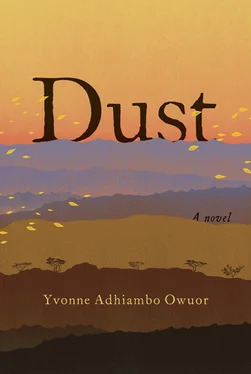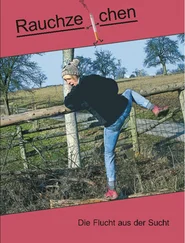Nyipir planted grass atop burial sites. Unlike Nyipir’s gardenias, the grass grew thick, green, and healthy.
After every hour, Warui gave Nyipir ten cents as well as half a tin of maize meal for the evening’s work.
Nyipir said, “Ona icembe riugi ni rituhaga.”
Warui spat, “Speak what you know, better still, don’t speak at all, you hear?”
They worked into the deep of night.
Few witnesses.
The inarticulate dead buried by mute gravediggers.
Warui once peered into the forest canopy and whispered, “It watches.”
Nyipir looked. “What?”
“Too many questions. Dig, dig.”
Nyipir returned to his real post at the mission hours before dawn, bathed his body with a pot of cold water, and went to huddle among the plants. They were stunted and stubborn but had gained a grudging root-hold. He also wondered why his body was trembling. All of a sudden he remembered that he had been handling human remains. He knelt over, head close to the earth, and vomited into the soil. Nothing left in his stomach. He stared at the mess and then covered it. Fifty cents . He told himself that every coin brought him closer to Burma and his father and brother.
Nyipir slept until cock’s crow.
The coins piled up.
But there was still not enough to even buy a train ticket to Nairobi.
The mission had told him that his food and board were payment enough, with a token two shillings a month for savings.
He needed more money.
When he asked Warui to increase his pay to twenty cents an hour, Warui laughed before clouting him in the ear.
“Work!”
One chilled night, Warui helped Nyipir bury a sack. The end of the sack burst open when they tossed it into a hole. Bloody hands and shriveled male genitals poured out. Nyipir gasped and turned to run; Warui barked at him once.
Nyipir stumbled and fell to the ground. Warui spat. “It’s better if your eyes are blind. Hear?”
Nyipir nodded, still dizzy.
They returned to seal the hole in the ground.
That night, needing to clear his head, Nyipir switched paths, walked into and through the safe forest fringes. He walked through cobwebs, the tingle on his face spreading all over his body. He marched on. The ground of Nyipir’s mind opened, and he spoke to the dead and their broken parts. And his father and brother walked with him. His mother joined them, as did his sister.
After he had wiped away tears, Nyipir saw that the forest unveiled a path. He stopped next to a mountain olive tree and waited before doubling back. He did not sleep at all. He knew there was a reward for giving information that led to the capture of rebels. That amount, added to what he already had, might be sufficient so he could take a train to Nairobi, and from there he knew he would find a way to Burma.
Nyipir woke up early to water the plants in the garden, long before morning Mass. He skipped breakfast, slipped out of the gate, and went next door, where the soldiers’ camp was.
After the parade, Nyipir approached a corporal and told him what he had seen in the forest the previous night. The corporal went and told an officer, who beckoned to Nyipir. The officer stood next to a fading whitewashed stone — a fierce son of a struggling empire leaning against the mast upon which the Union Jack quivered. “What do you want?”
Nyipir stuttered the story of a covered diversion waiting in the forest. The field officer was a wiry, medium-height man with a ragged strawberry-blond beard. He listened to Nyipir, dolorous eyes becoming smaller and smaller.
The man said, “Right, boy! I’ll arrange things with the padres.”
That night, Nyipir rode in a Land Rover for the first time in his life and decided that this was all he would ever drive. Four others, one informant, a young soldier who had blackened his face, whose lips gleamed pale, and three armed home guards, in the car. The road was bumpy. The Land Rover slid down slippery grooves, then halted. The men leapt out. Nyipir led the way to the path he had seen. The men crawled through the thick undergrowth.
An advance tracking squad had brought in a man on suspicion of being an oath giver. Nyipir was standing next to a guard when the man looked straight at him and said, “I surrender. And you?”
Nyipir puzzled over that.
The men eased their way into the concealed path, rifles at the ready, as silent as hunting cats. Nyipir, who had been ordered up a massive Wild Olive tree to wait and whistle an alarm if he saw anything untoward, ached to be part of the fierce band of men. Within the branches of the tree, Nyipir made a pistol shape with his right hand: two fingers pointing out, thumb up, two fingers in his palm. He waited up there until the hunters reappeared at dawn.
The following afternoon, Nyipir was redeployed from the mission to the camp — more of the same work but with guard duties thrown in and better pay. He became the camp’s odd-jobs boy, until two months later, on a frost-cold day, he was ordered by the commandant to join a group of men sent to retrieve bodies from a hut: a beheaded old man, a hanged youth about his age, a toddler, and two split-apart young women. The attempts to torch the hut had failed. Only the doors and windows were scorched.
So this was war? Nyipir had pressed his face into the soil and screamed until he blacked out. Cold water and invective revived him, supplemented by a kick on his rear.
He imagined he could leave. “Afande,” he pleaded with a tow-headed junior officer, “this is sickness. If I stay, I’ll surely die.”
The man had guffawed and pounded Nyipir’s back twice. “Gets easier, boy, don’t worry.”
It didn’t.
And then Aloys Kamau.
More collecting of hacked-to-death human casualties of a small war.
A convulsing Italian priest drenching the site of death with holy water and incense, chanting, “Aloys Kamau,” instead of prayers.
The priest was long-faced, dark-haired, as bony as an Ankole cow in the drought. His cassock was disheveled; he had a swollen face from a cracked, pus-filled molar.
He had grabbed onto the police officer who had turned gray at the human mess scattered around. In a bass voice the priest howled, “ This is a teacher of children — oh God — of children.”
Much later, the priest, chewing sour tobacco, attempted to seize sense through staccato phrases. “That oath,” he growled, “that … black sacrament … that cursed, roaming architect of sin … this vile landlord …” He swallowed the tobacco instead of spitting it out. Choking, crying.
“Aloys abjured the oath.”
A week later, the children he taught gathered to spit on him as one. “Oh! Miei bambini.” The priest groaned. “Their poor souls.” He sputtered his knowledge, and his hearers, Nyipir included, understood that Aloys Kamau had tried to save another teacher’s life, a man who was being chopped up by seven men in front of his students. Aloys had intervened. He could have escaped. He did not.
Silence.
Then a palpable existential dread invaded the landscape, and the men moved closer together while the priest bayed, “Why are we here?” over and over. No birds sang. The priest howled at silent clouds, “We are simpletons. What can we do? Send exorcists, for God’s sake. Send them exorcists!”
No birds sang.
Later, Nyipir would scrape the ground, looking around. This is a body , he thought as he waited for the brooding dread to materialize and crush them all. He gathered everything he could that was once Aloys — pieces of body in the sack. A wide dark spot marked the ground where Aloys had fallen. The priest stared at the site, paralyzed, and Nyipir thought, This is blood , and waited for the rumble that would surely end a world confronted by this horror.
Читать дальше











